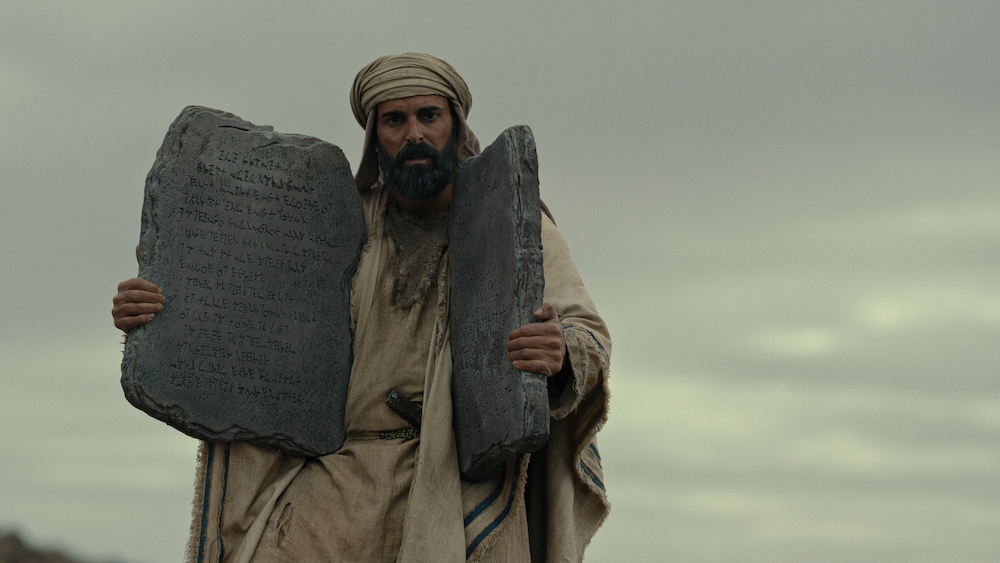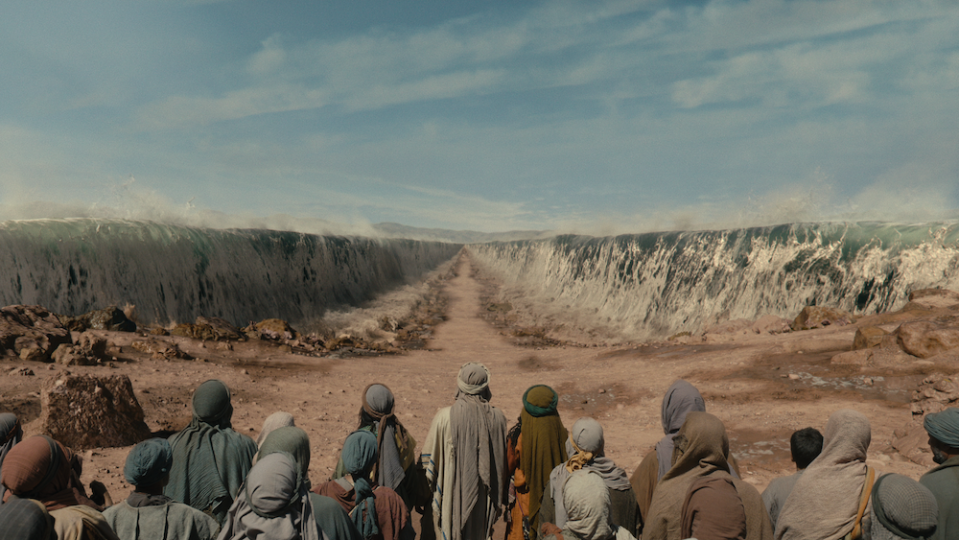Netflix’s ‘Story of Moses’ Is as Dry as the Desert, but Built to Tempt Next-Gen Believers

A priest, a rabbi, and an imam walk into a bar. The young bartender sets down her phone, looks at the priest and asks, “What can I get ya?” The priest says, “Good afternoon, my child. We were just discussing the story of Moses, which may be of interest to you. It’s about service, patience, and–” “Let me stop you right there, Father,” the bartender says. “Before you launch into your story, maybe the rabbi would like to order?” The rabbi turns to the bartender and says, “Ah, thank you, young lady. But my thirst is like the Hebrews’ wandering the desert: meaningless compared to the holy mission of our greatest prophet.” The bartender sips her hard seltzer and looks at the imam. “I’m guessing you agree?” “Absolutely,” the imam replies “The story of Moses carries great wisdom. It deserves to be heard.”
“Well,” the bartender says, “I guess that settles it.” She picks up her phone, puts in her earbuds, and ignores the three wise men at the counter. Aghast, the priest says, “Excuse me, but what about our story?” The bartender turns to show them her screen, where a fading Netflix logo gives way to “Testament: The Story of Moses.” “Don’t bother, my dudes. I’ve got it right here.”
More from IndieWire
The above “joke” may not be funny (I’m sorry) and requires a few leaps in logic (like a priest would ever willingly wait for a drink), but it does neatly sum up “Testament: The Story of Moses,” a new Netflix series that doubles as a religious study guide for its titular prophet. Recapping the Old Testament with scripted “recreations” and talking-head interviews, the three-part series isn’t a huge dramatic lift. There’s no nuance added or fresh perspective explored. The “Story” simply intends to spread God’s word via the world’s most popular streaming service. The multi-denominational telling may feel incomplete to priests, rabbis, and imams, but baptism by Netflix may prove more tolerable to today’s youth than traditional sermons. (And it will certainly become every substitute Sunday school teacher’s best friend.)
Directed and co-written by Benjamin Ross (“The Frankenstein Chronicles”), “Testament” tracks Moses from womb to tomb. The first episode (“The Prophet”) covers his birth, exile, and return to Egypt; the second (“The Plagues”) sees Moses throw down with the Pharaoh over all those enslaved Hebrews; and the third (“The Promised Land”) follows our man from the mountaintop as he leads his people to salvation.
Each step across the desert follows a well-worn path, as “The Story of Moses” adheres to the main beats outlined by thousands of authors and interpreters over the past five centuries or so. Aside from its studio (Netflix), the only unique angle is its hybrid storytelling mode: Roughly half the scenes are staged — with a capable Avi Azulay playing Moses and passable VFX depicting various plagues and miracles — and the other half contains incurious interviews with priests, rabbis, theologians, and historians, whose views (clarified by an ominous opening title card) are meant to “enrich the narrative … not be understood as consensus.”
Besides the implication of forthcoming dissension, I cannot imagine any of the expert commentary stirring up much more than polite disagreement. (Of course, those with more faith than this lapsed Catholic lad can likely find reason to be riled up if they so choose.) What’s most upsetting is how easily the Netflix template gets mapped onto a two-thousand-year-old story, including a pre-credits teaser reel — you can practically hear the baritone trailer voice saying, “Keep watching to witness the parting of the red sea and a PLAGUE OF FROGS!” — plus a flashback midway through Episode 1 that reveals how Moses ends up with a secret brother.

“Testament: The Story of Moses” sits comfortably between the streaming giant’s educational programming (like the Vox “Explainer” series or the “Headspace” guides to sleep, meditation, etc.) and historical offerings (like “Alexander: The Making of a God”). It’s also, of course, trying to capitalize on the lucrative faith-based movie movement currently defying traditional Hollywood distributors, but lumping it in with those projects would indicate Netflix is playing someone else’s game, rather than sticking to its own playbook. Former co-CEO Reed Hastings once said the service’s No. 1 competitor wasn’t HBO or Disney; it was sleep. Take that line of thinking to its next logical step, and Netflix’s non-entertainment programming makes sense: Netflix doesn’t just want subscribers to open the app when they want mindless entertainment; they should open the app when they want to learn (via mind-lite entertainment). Whether that’s learning how to meditate or learning about Moses, Netflix has you covered.
So rather than judge “The Story of Moses” as a wannabe docuseries any average viewer might watch on a Wednesday night — which seems unlikely, especially if they’ve already seen “The Ten Commandments” or, God forbid, went to eight years of Catholic school — perhaps it’s better to asses this “Testament’s” real purpose: catering to the converted. While your long-time churchgoers or seder guests may not find anything to chew on here, there is a concerted effort to appeal to a younger crowd; a generation who grew up on Netflix, or is at least more prone to watch a show about Moses than pick up an actual Bible, Torah, or Qur’an and practice the antiquated art of reading (ew).
“Testament’s” talking heads are quick to draw comparisons between Moses’ quest and modern causes that should appeal to progressive-minded kids (aka, the demo losing their religion). Rabbi Shlomo Einhorn bluntly posits that “social justice began with Moses,” while Dr. Carol Meyers suggests you remember the Hebrew midwives’ defiant stand against their Pharaoh — you know, when they chose not to kill a bunch of newborn babies — “as the first act of civil disobedience.” There are also repeated attempts to elevate women in a story dominated by three male-presenting characters (Moses, the Pharaoh, and God Himself, voiced by Clarke Peters). Rabbi Maurice Harris emphasizes the “extraordinary” risks women took to protect Moses; Dr. Celene Ibrahim waxes poetic about how rare it is for a story about “a revolution” to begin with the main revolutionary’s birth, and thus, his mother; then, in a huge break from traditional Biblical values, one of the staged scenes even shows Moses acting submissive to his wife.
Grouped together like this, such statements carry a little more heft than they do when spread across four-and-a-half hours, but it’s clear “Testament” is trying, at least, to direct a message older than Charlton Heston at a generation not even old enough to remember “Bowling for Columbine.” If that sounds like something your kids (or you, kids) might be interested in, then go ahead and add “Testament” to the queue. With a little help from streaming, perhaps commandments carved into stone can outlast words written on paper. Let’s end it there — I’ve still got to transubstantiate this review into a TikTok.
Grade: C
“Testament: The Story of Moses” premieres Wednesday, March 27 on Netflix. All three episodes will be released at once.
Best of IndieWire
Sign up for Indiewire's Newsletter. For the latest news, follow us on Facebook, Twitter, and Instagram.


